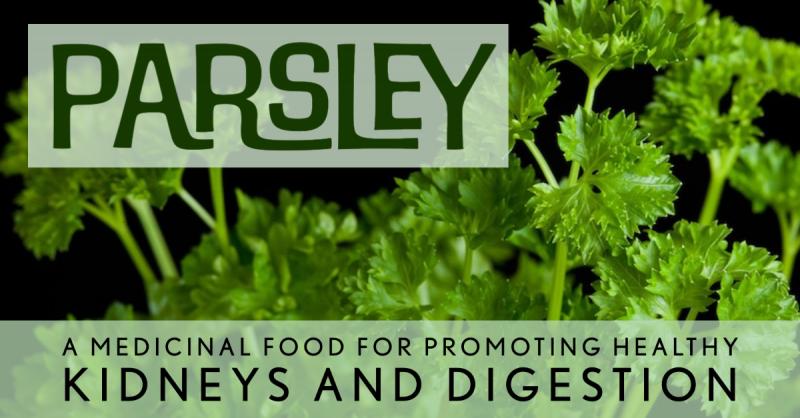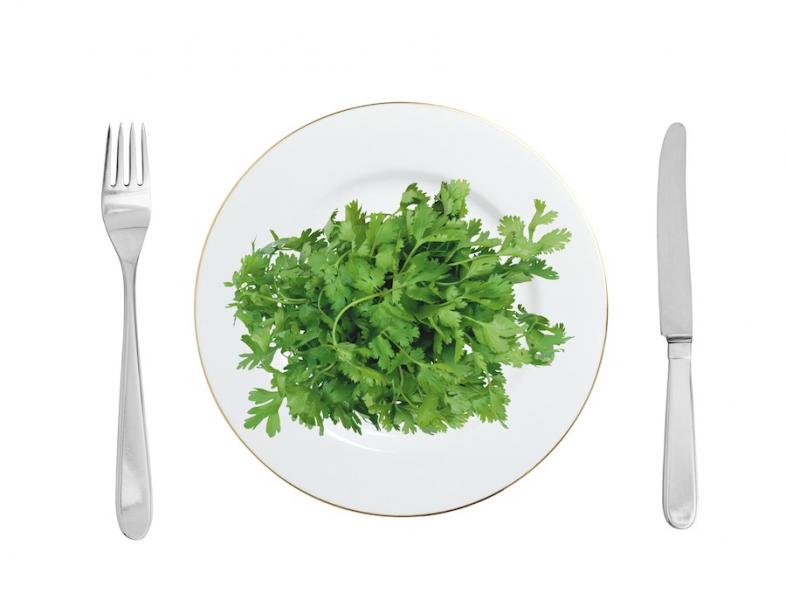
Have you ever been served a meal with a sprig of parsley on the plate as a garnish? It used to be a common practice, although you don’t see it as much these days. If you do see parsley on your plate, though, I hope you eat it. Parsley is more than just a fancy garnish, it’s also a wonderful medicinal herb for digestive and urinary health.
Parsley is both stimulating and nourishing to the kidneys. It contains a volatile oil that is excreted through the kidneys, thus stimulating urination. But, it’s not as irritating as juniper and other stronger diuretics and also has a high content of natural potassium and sodium, mineral electrolytes that help regulate fluid balance and kidney function. Parsley can be helpful for edema, nephritis, cystitis, burning, scalding, or otherwise painful urination, and scant urination. Years ago, an Australian naturopath told me that if we ate a sprig of parsley every day we’d never have kidney problems.
Rich Source of Mineral Electrolytes
 According to Mark Pederson’s Nutritional Herbology book, parsley is one of the highest herbs in both potassium and sodium, and is also rated as having a high content of magnesium, calcium, and phosphorus. These mineral electrolytes are what make herbs “salty” in herbal energetics. Salty herbs help regulate fluids in the body and can be used not only to aid kidney function, but also to reduce lymphatic congestion and edema. As such, parsley can be helpful for swollen lymph glands and breast swelling and tenderness.
According to Mark Pederson’s Nutritional Herbology book, parsley is one of the highest herbs in both potassium and sodium, and is also rated as having a high content of magnesium, calcium, and phosphorus. These mineral electrolytes are what make herbs “salty” in herbal energetics. Salty herbs help regulate fluids in the body and can be used not only to aid kidney function, but also to reduce lymphatic congestion and edema. As such, parsley can be helpful for swollen lymph glands and breast swelling and tenderness.
However, since parsley helps dry up breast milk, nursing mothers should avoid it. It’s also considered a mild emmenagogue, an herb that promotes menstruation. It’s not very strong, but to play it on the safe side you may want to limit its use during pregnancy.
Herbs high in these minerals also help the structural system. Chinese medicine recognizes that tonifying the kidneys helps the bones. I’d say that parsley qualifies as a kidney tonic that also supports the bones.
Other Benefits of Parsley
Parsley is also rich in chlorophyll, the stuff that makes plants green and photosynthesis possible. Because of its rich aromatic-based chlorophyll content, parsley is helpful for reducing bad breath, which could be one of the reasons it’s been traditionally used as a garnish on the plate. It is also a mild digestive stimulant so it aids digestion, too.
Fresh parsley juice can also be helpful for the lungs. It can help with asthma and coughs. The dried stuff doesn’t have as much essential oil and is probably less effective for respiratory or digestive problems than fresh parsley.
Tabbouleh Salad
 One of my favorite ways to eat parsley is in tabbouleh salad. This is a Middle Eastern dish traditionally made with couscous, a wheat product. I make it with millet, which not only tastes better in my opinion, but I think is much healthier. People also make it with quinoa. To make it, you'll need two cups of your cooked grain of choice. Chop up two bunches of parsley and mix it in the grain. You can also add a few springs of chopped fresh spearmint or peppermint and a little bit of chopped onion if you like. Most recipes also call for chopped tomatoes and/or cucumbers. I'll only add tomatoes when they are in season because I find they aren't very good otherwise. Season it with a little salt and pepper to taste.
One of my favorite ways to eat parsley is in tabbouleh salad. This is a Middle Eastern dish traditionally made with couscous, a wheat product. I make it with millet, which not only tastes better in my opinion, but I think is much healthier. People also make it with quinoa. To make it, you'll need two cups of your cooked grain of choice. Chop up two bunches of parsley and mix it in the grain. You can also add a few springs of chopped fresh spearmint or peppermint and a little bit of chopped onion if you like. Most recipes also call for chopped tomatoes and/or cucumbers. I'll only add tomatoes when they are in season because I find they aren't very good otherwise. Season it with a little salt and pepper to taste.
The dressing is a mixture of olive oil and lemon juice, about ¼ cup of each. Mix them together and then mix it into the salad. I find it wonderful, especially served with some hummus and feta cheese.
Parsley is also a great herb to add to stock, soups, or stews. It adds minerals and a few vitamins as well as flavor. You can also make a tea of the fresh or dried herb, but this is one herb that I think is best used fresh. It’s just one more example of how your food can also be your medicine.
Downloads
Steven's Articles
-

-
Eucommia Bark
A superior tonic that promotes kidney, structural,…
January
-

-
Goldenthread, Phellodendron, and Yellow Root
Three herbal remedies containing the infection-fighting…
-

-
Teasel
A traditional herb for healing bones and joints…
-

-
Barberry and Healthy Personal Boundaries
A thorny shrub for fighting infections and supporting…
December
-

-
The Evidence for Berberine
A yellow alkaloid found in traditional infection-fighting…
-

-
The Sensible Use of Caffeinated Herbs
Kola nuts, guarana, and yerba mate and other herbs…
-

-
The Health Benefits and Problems with Coffee
This popular caffeinated beverage can be beneficial…
October
-

-
Understanding Caffeine & Cellular Adaptation
Preserving the power of caffeine's buzz and the…
September
-

-
Horseradish
A pungent spice for aiding protein metabolism…
-

-
Banaba or Crepe Myrtle
A beautiful tree from Southeast Asia whose leaves…
August
-

-
Monkeyflowers
Flower essences to help see ourselves more clearly…
-

-
Mariposa Lilies
Strengthening the bond between mother and child…
-

-
The Noble Bay Leaf
A common kitchen herb for aiding digestion and…
-

-
Epimedium: Horny Goat Weed
A circulatory stimulant and kidney yang tonic…
July
-

-
The Medicinal and Nutritional Benefits of Apricots
A nutritious fruit and valuable medicinal seed for coughs

